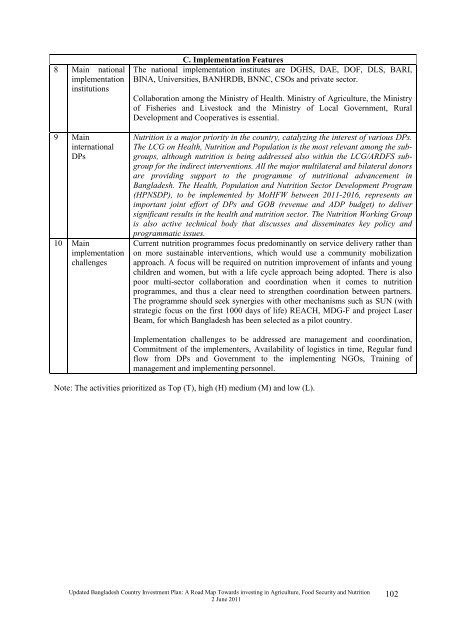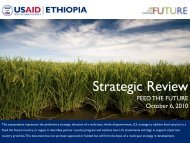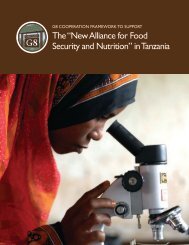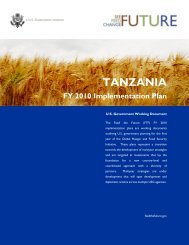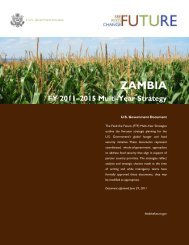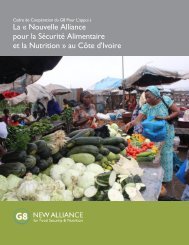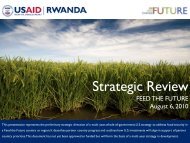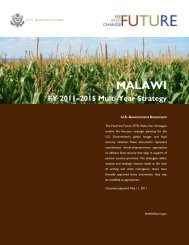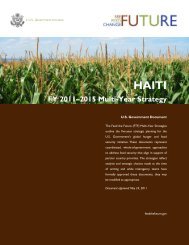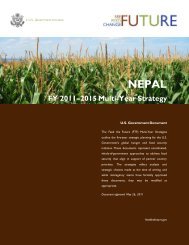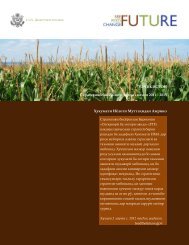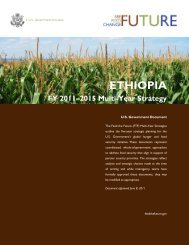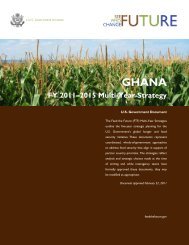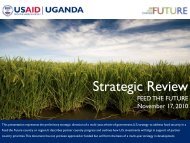Bangladesh Country Investment Plan - Feed the Future
Bangladesh Country Investment Plan - Feed the Future
Bangladesh Country Investment Plan - Feed the Future
Create successful ePaper yourself
Turn your PDF publications into a flip-book with our unique Google optimized e-Paper software.
8 Main national<br />
implementation<br />
institutions<br />
9 Main<br />
international<br />
DPs<br />
10 Main<br />
implementation<br />
challenges<br />
C. Implementation Features<br />
The national implementation institutes are DGHS, DAE, DOF, DLS, BARI,<br />
BINA, Universities, BANHRDB, BNNC, CSOs and private sector.<br />
Collaboration among <strong>the</strong> Ministry of Health. Ministry of Agriculture, <strong>the</strong> Ministry<br />
of Fisheries and Livestock and <strong>the</strong> Ministry of Local Government, Rural<br />
Development and Cooperatives is essential.<br />
Nutrition is a major priority in <strong>the</strong> country, catalyzing <strong>the</strong> interest of various DPs.<br />
The LCG on Health, Nutrition and Population is <strong>the</strong> most relevant among <strong>the</strong> subgroups,<br />
although nutrition is being addressed also within <strong>the</strong> LCG/ARDFS subgroup<br />
for <strong>the</strong> indirect interventions. All <strong>the</strong> major multilateral and bilateral donors<br />
are providing support to <strong>the</strong> programme of nutritional advancement in<br />
<strong>Bangladesh</strong>. The Health, Population and Nutrition Sector Development Program<br />
(HPNSDP), to be implemented by MoHFW between 2011-2016, represents an<br />
important joint effort of DPs and GOB (revenue and ADP budget) to deliver<br />
significant results in <strong>the</strong> health and nutrition sector. The Nutrition Working Group<br />
is also active technical body that discusses and disseminates key policy and<br />
programmatic issues.<br />
Current nutrition programmes focus predominantly on service delivery ra<strong>the</strong>r than<br />
on more sustainable interventions, which would use a community mobilization<br />
approach. A focus will be required on nutrition improvement of infants and young<br />
children and women, but with a life cycle approach being adopted. There is also<br />
poor multi-sector collaboration and coordination when it comes to nutrition<br />
programmes, and thus a clear need to streng<strong>the</strong>n coordination between partners.<br />
The programme should seek synergies with o<strong>the</strong>r mechanisms such as SUN (with<br />
strategic focus on <strong>the</strong> first 1000 days of life) REACH, MDG-F and project Laser<br />
Beam, for which <strong>Bangladesh</strong> has been selected as a pilot country.<br />
Implementation challenges to be addressed are management and coordination,<br />
Commitment of <strong>the</strong> implementers, Availability of logistics in time, Regular fund<br />
flow from DPs and Government to <strong>the</strong> implementing NGOs, Training of<br />
management and implementing personnel.<br />
Note: The activities prioritized as Top (T), high (H) medium (M) and low (L).<br />
Updated <strong>Bangladesh</strong> <strong>Country</strong> <strong>Investment</strong> <strong>Plan</strong>: A Road Map Towards investing in Agriculture, Food Security and Nutrition<br />
2 June 2011<br />
102


